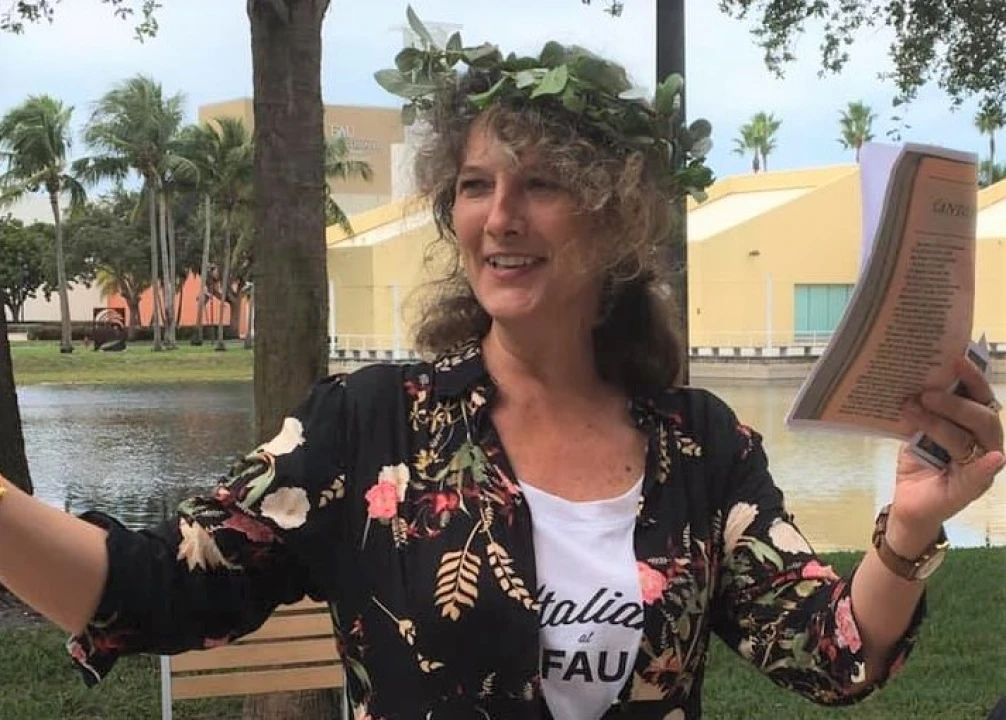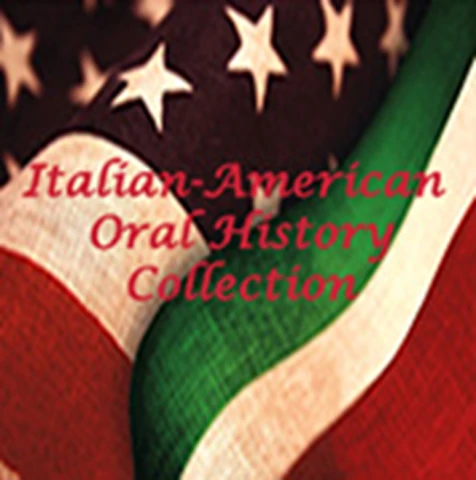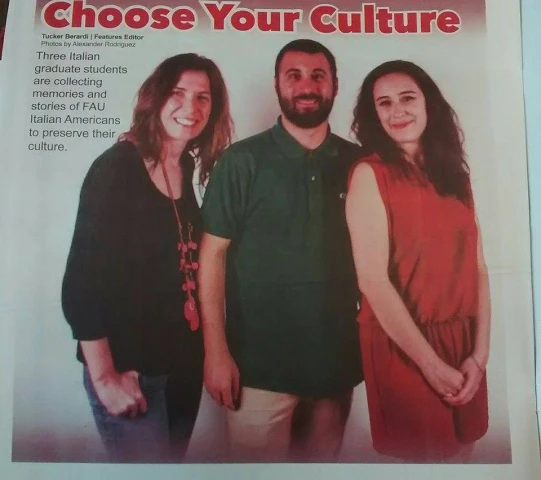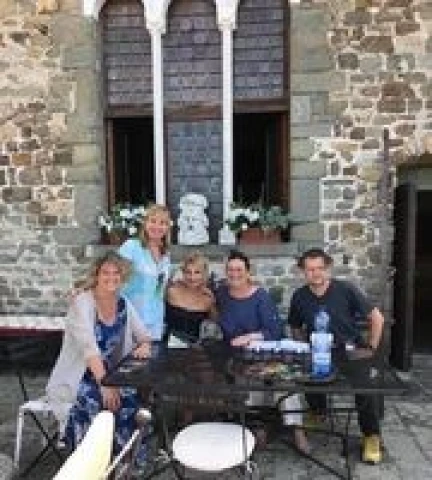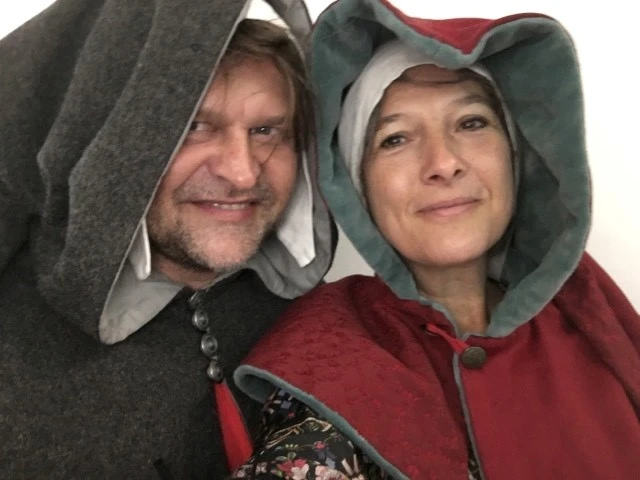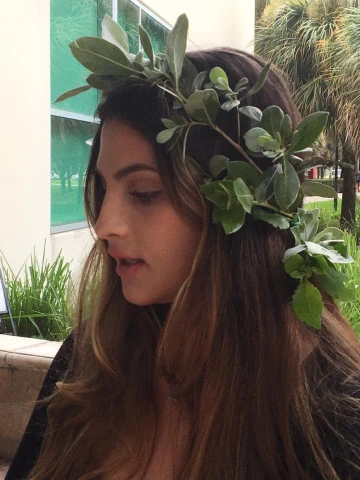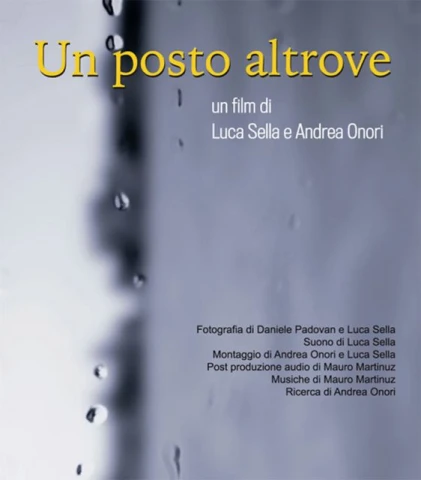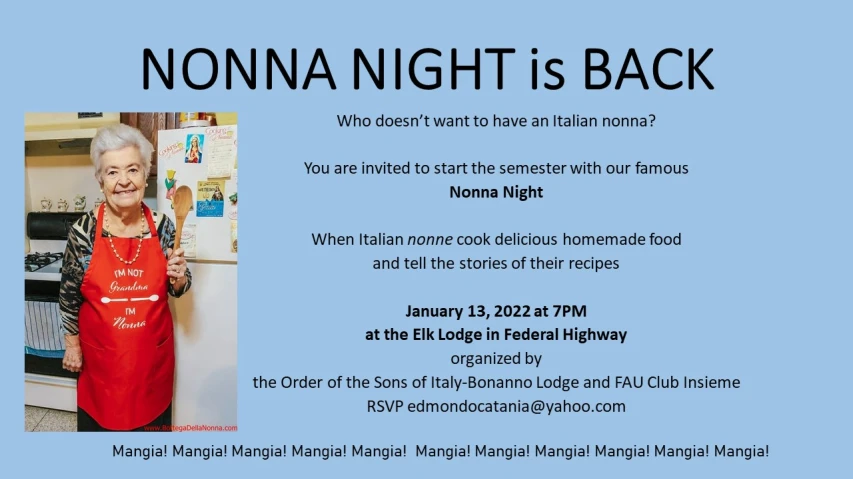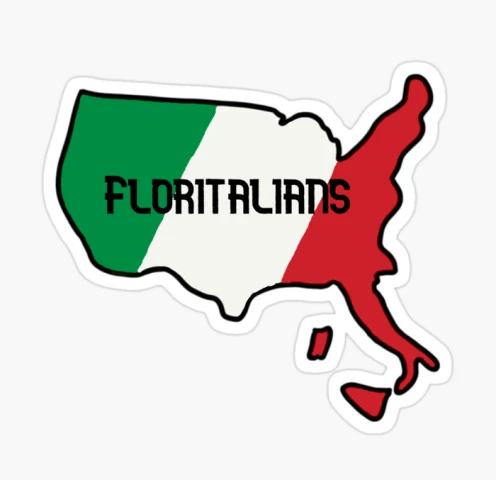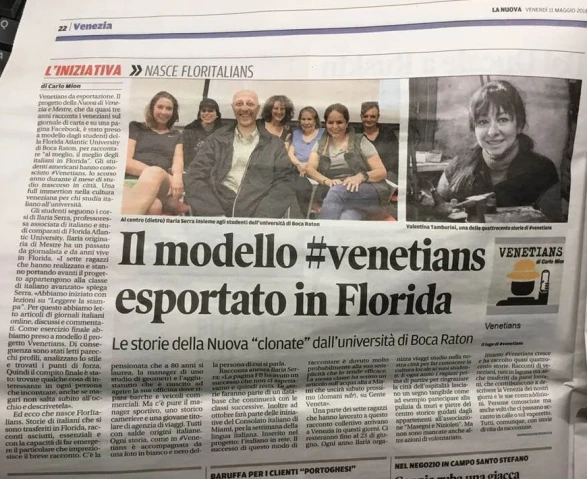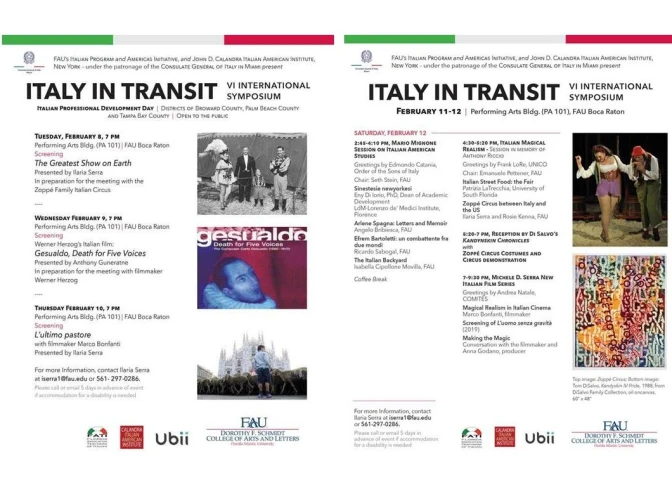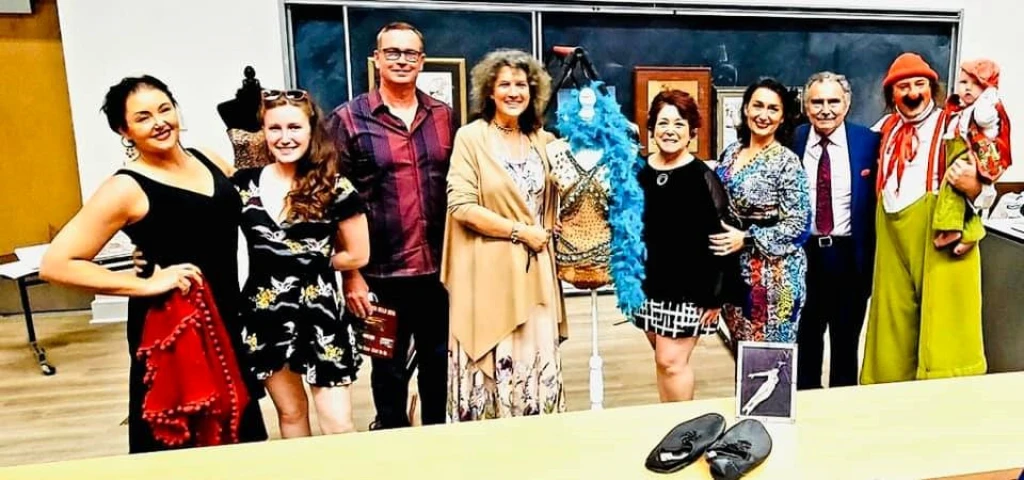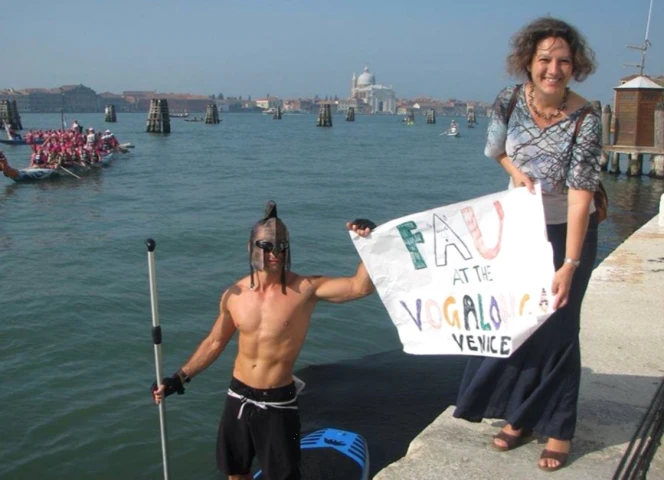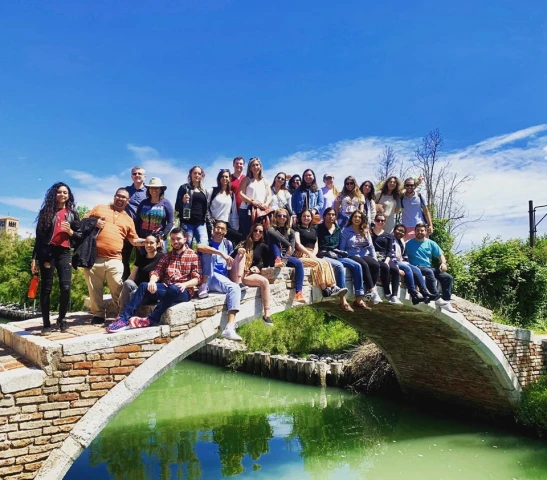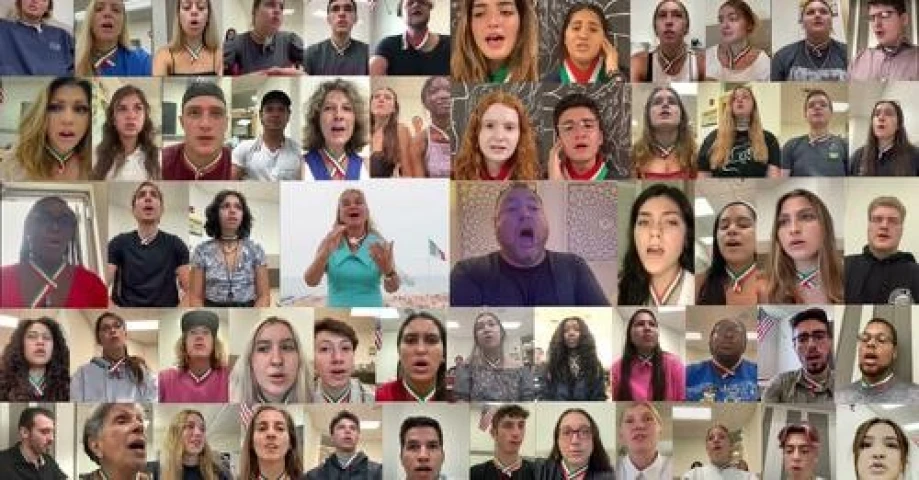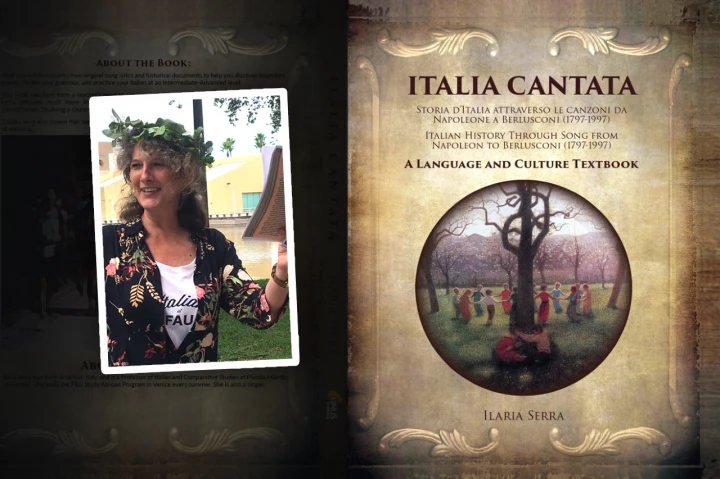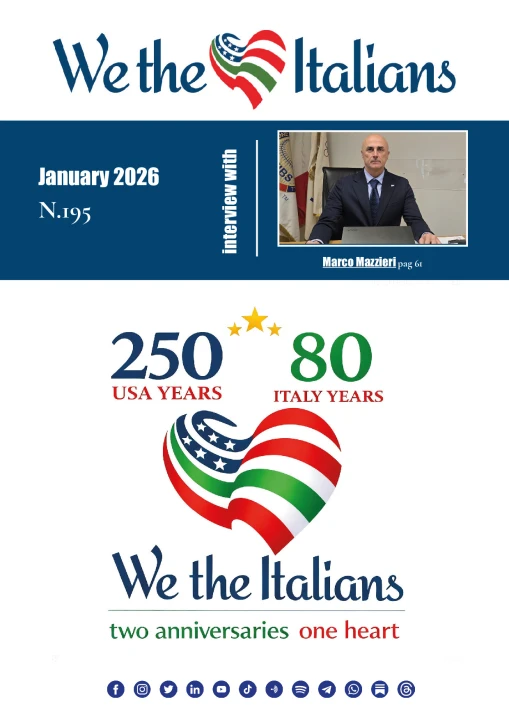Italy has wonderful representatives in the United States who tell its story, exalt its culture and language, narrate its traditions and innovations, its places and its beauties. To see them from Italy, where we are always ready to describe only our worst things, is exciting.
One of the most competent people I have met in this field is also a person I have the honor to call a friend. Ilaria Serra is Professor of Italian and Comparative Studies at Florida Atlantic University where she earned a Ph.D. in Comparative Studies. With her husband Emanuele Pettener, another great friend of mine and of We the Italians, they share a wonderful family, a great job representing Italy in America and the esteem, friendship and admiration of those who have known them over the years. It is a great pleasure for me to welcome Ilaria Serra to We the Italians.
Ilaria, first of all please tell our readers something about you, from Venice to Florida…
No, first of all let me tell you I am honored to be part of We the Italians! It is where I come across some of my best research ideas. You have a good nose, Umberto.
Yes, I graduated from the University of Venice, where I also worked as a journalist and a teacher of Italian for foreigners. After my graduate studies at UCLA and Purdue University, and after working in the Czech Republic, I landed in Boca Raton. I have been working at Florida Atlantic University for 22 years, a University that supports new ideas and research, not with large sums, as we are a public university but with some resources. Now my heart is divided. I go back to Italy every summer and I try keeping one foot in two shoes.
You organize so many activities at FAU, I couldn’t choose which ones are the most interesting… I leave it to you, please describe us a bit how you promote and teach Italy in Boca Raton
Yes, it’s too much to tell. Most of it is on our website. We organize events that are thought for students but are open to the community of Italians and the Italian Americans. Our classes incorporate research projects that link the community to the academic world.
For example, in addition to multiple movie nights during the semester, we created the Italian-American Film Festival, and we already ran two editions. Basil Russo, the President of the Sons and Daughters of Italy in America, was a special guest. His children, the Russo brothers filmmakers, fund the grant that produced many of the films we showed. Well, Russo said it was the first student run Italian American film festival in the nation!
We started the Italian American Oral History Archive, housed in the FAU Library, which collects interviews made by our graduate students to Italian Americans who live in Florida.
We also created and maintain the Itamm-Italian American Memories Documentary Archive, which is a database of marvelous documents. It contains hundreds of WWII letters and postcards from an Italian American family Badia-Johnson; the “Curbside History” of the Fruttauro-Vivo family letters (donated by the Calandra Institute in New York); the pictures of the Zoppè Family Circus who left Treviso to come to the US and work in the Ringling Circus; the paintings of the virtual exhibition by Tom DiSalvo (Domenica Diraviam’s dissertation in progress). To work on this website, our GKA chapter organizes a Research Day every semester, where undergraduate and graduate students and even community members, work hands-on on these primary sources.
The most recent GKA Research Day was dedicated to deciphering the manuscript of a 1812 opera, discovered in a Castle in Tuscany, that will be the dissertation topic of one of our PhD students, Barbara Salani.
This is part of a bigger project we are launching right now: a summer research camp on Music and Poetry in Castiglione del Terziere, this amazing little treasure of a castle on the hilltop of Lunigiana in Tuscany. We are accepting applications for this summer, June 2022. We will have singing Master classes with a FAU baritone Mitchell Hutchings, and pianist Barbara Salani, while Emanuele and I will lead a poetry camp on the poems by the late castle owner, Loris Jacopo Bononi. We will expand the concept of the “geometafora” that I recently proposed, and work on creative writing in Italian (Emanuele’s course “Italian Writing Workshop” is always a success at FAU).
The Italian Consulate in Miami often works alongside with Florida Atlantic University?
Yes, we appreciate that Italian Consul General in Miami, Cristiano Musillo, the Vice-Consul, Eva Alvino, and especially their director of education, Maria Rosa Borghi, are always supportive of us.
They help us organize concerts and shows. Last Fall, the Consul General and the ODLI facilitated the set up of a Medieval costume show brought from Narni, Umbria. The costumes were closely inspected and enjoyed by students and community members. And, during the show’s opening, we had a beautiful celebration for the 700 years of Dante’s death with a three-hours “Divine Comedy Reading Marathon” with all our students. One of them, who is a chef, made homemade chocolate inspired from the Perugina recipe.
Emanuele Pettener involves our students in creative writing projects and translations. They have already published on on-line journals, and they regularly contribute to the website we created with Valentina De Cesare in Milan, titled “Strade Dorate. Osservatorio di Cultura Italoamericana”.
I probably could go on… In general, our goal is to bring out the best in our students, even undergraduate. They have translated and created the subtitles for a movie, they have translated family histories, they have presented at Undergraduate Research Symposia.
In general, we try to create a positive synergy between university and territory. A small example: students gather in the Italian Club “Insieme” and GKA Italian Honor Society, but we do not only have open conversation hours on campus. We also meet off campus, and invite everyone to engage in conversation. We welcome the talent and the generosity of those who live around here.
You know where this synergy brought? Our students were able to convince the “nonne” of Boca Raton to cook for them! They invented the “Nonna Night” with the Bonanno Lodge of Order of Sons of Italy. It is one of our most successful activities. It joins food and stories from the local Italian nonni.
The best personal satisfaction maybe is when a student, Brittni, asked me to perform the ceremony in Italian and English for her wedding to a great Italian boy!
What is FlorItalians?
It is a series of Portraits of Italians who live in Florida, written by advanced undergraduate students. They interview them in Italian so they practice their language skills with native speakers. They are published on Facebook and on a webpage. It started in the class I regularly teach, titled “Leggere la Stampa.” The idea came to me from “Venetians,” a column that journalist Carlo Mion writes in Venice, and “Humans of New York.” I thought it would be a good way to connect the students with the Italy that is around them, and make them discover the richness Italians bring to Florida.
Recently you organized Italy in Transit, and it was a big success: what is it?
I am always surprised by this International Symposium! It started 6 years ago when Anthony Tamburri nudged me to start thinking about an academic meeting. It became a unique event, a colorful and variegated meeting of intellectuals, artists, academics, students at all levels, and community members. Every year I spread my nets and I so much talent and humanity remains caught in them. There is an unspoken rule: each speaker should remain for the entire symposium so that there is a real exchange of ideas. The students are the first to benefit in this connection, and beautiful friendships are born.
Last year, since we had to use Zoom, we stretched it to the maximum and we had the first Summit of Italians in Transit, with a Q&A across 24 time zones! From Brazil, New Zealand, Hawaii, South Africa, Iceland… and the Mission to Mars! It was incredible.
This year we presented a research on Tom Di Salvo, local painter and late friend of FAU Italian, in comparison with the beautiful stories painted by Ralph Fasanella. Ralph’s son, Marc, drove to Florida and we are now creating a new scholarship on his father’s work, funded by the sale of his books and posters.
There were many other incredible meetings, even Werner Herzog appeared after we watched his Italian documentary on Gesualdo. And we are especially proud of our students, like Austin Sanniota Edwards and Dr. Marianna DeTollis, who are now teachers of Italian in high schools and had their students present for us.
This year, the Symposium included the Michele D. Serra New Italian Cinema Film Series, which is dedicated to the memory of my father who was an expert in intercultural communication. The ninth lecture was given by filmmaker Andrea Bonfanti and producer Anna Godano, who presented their films, including L’Ultimo Pastore and The Man Without Gravity.
Another personal highlight in the last Symposium is when I showed the photos and story of the Zoppè Italian Family Circus (which by the way I discovered through We the Italians and I thanked you in the opening slide!). I could not believe it when the whole family came to the Symposium, and Tino Wallenda and Giovanni Zoppè performed! I don’t think I can make a more entertaining academic presentation than that…
You founded and co-lead the FAU Study Abroad Program in Venice…
Speak of keeping a foot in two shoes… I could not leave Venice and I had to share it with my students. My husband, Emanuele Pettener and I started this program 12 years ago. Students come to our city for 6 weeks, and they take two courses: Italian language and the culture course “Venice and Its Reflections,” but also Architecture or Geography. Most of all, they live in the city and they live the city: we visit all museums, but we also participate in all city events and we volunteer with local organizations. We cleaned the walls, we made masks with special need kids, we gather plastic from the lagoon, one student volunteered in St. Mark’s Choir and one in the Cat Shelter (she is now a veterinarian). Venice and foreigners have a conflicted relationship and our students want to leave a good mark.
Even regarding the topics you wrote about, in books and articles, there’s so many I wouldn’t want to leave something out, but it’s impossible not to. I am particularly curious about this one you published in 2011: “Teaching Italy Through Its Music. The Meaning of Music in Italian Cultural History”. Please tell me a bit more about this
I am still working on that topic… I designed a course that teaches students Italian history through songs. It is titled “Italy in Lyrics.” The idea at the base is that singing is the best way to hammer words into our memory, but if what we sing has historical or cultural meaning, then we learn so much more. Sharing a soundtrack is sharing a common ground, at a sensorial, deeper level and this facilitates a meeting of cultures. Music accompanies important moments of life: lullabies and war songs, celebrations and school rhymes, propaganda and protest, physical works and strike marches… I wanted students to learn what is contained in a song, besides the words. And to be transported in the Italian past.
And talking about music, you also recently published your new book: “Italia cantata: Storia d’Italia attraverso le canzoni da Napoleone a Berlusconi, 1797-1997” [Linus Learning]. It seems very interesting…
That is a textbook for advanced Italian students that combines the songs’ historical context, with listening activities and grammar exercises, and the study of original written and visual documents. It can be used in advanced and intermediate courses that do not have so much material available.
The course “Italy in Lyrics” instead is for English speakers, and I have a manuscript in English ready to be published on the topic. Fingers crossed…
It seems that music has a big importance in your curriculum…
Yes, we had the fortune to enroll Barbara Salani as a PhD student. She is a pianist and a composer, and is full of enthusiasm. With her help, we created an Italian Program Choir (informally!) where we involve students in several concerts. In 2019 we had “Italiano sul Palcoscenico” which brought more than 800 people to our auditorium and more than 120 students, elementary to college, on the stage.
During COVID we produced the “Libiamo” choir from Verdi’s Traviata to send an encouragement during our isolation.
In spring 2021 we were able to have a concert outside, and we dedicated it to Myriam Ruthenberg, the founder of the Italian Program, who retired. I think she was the only Professor at FAU who was greeted with an entire concert!
Last Fall, Barbara united all our students and those of other schools for the video of “Tanto gentile e tanto onesta pare,” Dante’s sonnet, that she put in music for the XXI Week of the Italian Language in the World.
You’ve been living in the US for quite a while now. Of course you come back every year, or at least you did before covid. What would you transplant from Italy to America, something you miss about Italy? And vice versa, what would you absolutely bring from America to Italy?
Yes, I have become the topic of my own research! Good part of my research is about Italian immigration to the United States. My books are about this topic… now I am an Italian American with a divided heart. But don’t make me choose one part over the other. I really hold on to both.
Besides my family and friends in Italy, some things I miss are the Venetian frittelle of Carnival, the smell of winter and calicantus, the sound of church bells from dawn to sunset, the Easter songs in my church. From the United States, I would bring back, the American tolerance and love for freedom, their optimism and openness, their easy laughter and … good customer service.
L’Italia ha meravigliosi rappresentanti negli Stati Uniti che la raccontano, ne esaltano la cultura e la lingua, ne narrano le tradizioni e le innovazioni, i luoghi, le sue bellezze. Vederli dall’Italia, dove sempre siamo pronti a descrivere solo le nostre cose peggiori, è emozionante.
Una delle più competenti persone che ho incontrato in questo campo è anche una persona che ho l’onore di definire amica. Ilaria Serra è Professoressa di Italiano e Studi Comparati alla Florida Atlantic University dove ha conseguito un Ph.D. in Studi Comparati. Con suo marito Emanuele Pettener, un altro grande amico mio personale e di We the Italians, condividono una splendida famiglia, un grande lavoro in rappresentanza dell’Italia in America e la stima, l’amicizia e l’ammirazione di coloro che li hanno conosciuti in questi anni. E’ un grande piacere per me dare il benvenuto su We the Italians a Ilaria Serra.
Ilaria, prima di tutto racconta ai nostri lettori qualcosa di te, da Venezia alla Florida...
No, prima di tutto lasciami dire che sono onorata di far parte di We the Italians! È dove trovo alcune delle mie migliori idee. Hai un buon fiuto, Umberto.
Sì, mi sono laureata all'Università di Venezia, dove ho lavorato anche come giornalista e insegnante di italiano per stranieri. Dopo gli studi universitari alla UCLA e alla Purdue University, e dopo aver lavorato nella Repubblica Ceca, sono approdata a Boca Raton. Da 22 anni lavoro alla Florida Atlantic University, un'università che sostiene le nuove idee e la ricerca, non con grandi somme, visto che siamo un'università pubblica, ma con alcune risorse. Ora il mio cuore è diviso. Torno in Italia ogni estate e cerco di tenere un piede in due scarpe.
Voi organizzate così tante attività alla FAU che non saprei scegliere quali sono le più interessanti... lascio la parola a te, descrivici un po' come promuovete e insegnate l'Italia a Boca Raton
Sì, c’è tantissimo da raccontare. La maggior parte è sul nostro sito web. Organizziamo eventi che sono pensati per gli studenti ma sono aperti alla comunità degli italiani e degli italoamericani. Le nostre classi incorporano progetti di ricerca che collegano la comunità al mondo accademico.
Per esempio, oltre alle molteplici serate di cinema durante il semestre, abbiamo creato l’Italian American Film Festival, e abbiamo già fatto due edizioni. Basil Russo, il presidente dell’Italian Sons and Daughters of America, è stato nostro ospite. I suoi figli, i registi Russo brothers, finanziano il grant che ha prodotto molti dei film che abbiamo mostrato. Beh, Russo ha detto che è stato il primo festival del cinema italoamericano gestito da studenti in America!
Abbiamo avviato l'Italian American Oral History Archive, ospitato nella Biblioteca della FAU, che raccoglie le interviste fatte dai nostri studenti laureati agli italoamericani che vivono in Florida.
Abbiamo anche creato e mantenuto l'Itamm-Italian American Memories Documentary Archive, che è un database di documenti meravigliosi. Contiene centinaia di lettere e cartoline della seconda guerra mondiale della famiglia italoamericana Badia-Johnson; la "Curbside History" delle lettere della famiglia Fruttauro-Vivo (donata dal Calandra Institute di New York); le foto del circo della famiglia Zoppè che lasciò Treviso per venire negli USA a lavorare nel Ringling Circus; i quadri della mostra virtuale di Tom DiSalvo (tesi di laurea di Domenica Diraviam in corso). Per lavorare su questo sito web, il nostro capitolo GKA organizza ogni semestre una Giornata della Ricerca, dove studenti universitari e laureati e anche membri della comunità lavorano direttamente su queste fonti primarie.
La più recente giornata di ricerca GKA è stata dedicata alla decifrazione del manoscritto di un'opera del 1812, scoperta in un castello in Toscana, che sarà l'argomento della tesi di uno dei nostri studenti di dottorato, Barbara Salani.
Questo fa parte di un progetto più grande che stiamo lanciando proprio ora: un campo di ricerca estivo su Musica e Poesia a Castiglione del Terziere, questo incredibile piccolo tesoro di un castello sulla collina della Lunigiana in Toscana. Stiamo accettando iscrizioni per quest'estate, giugno 2022. Avremo master class di canto con il baritono Mitchell Hutchings della FAU e la pianista Barbara Salani, mentre Emanuele ed io condurremo un campo di poesia sulle poesie del defunto proprietario del castello, Loris Jacopo Bononi. Espanderemo il concetto di "geometafora" che ho recentemente proposto, e lavoreremo sulla scrittura creativa in italiano (il corso di Emanuele "Italian Writing Workshop" è sempre un successo alla FAU).
Il Consolato italiano a Miami lavora spesso insieme alla Florida Atlantic University?
Sì, apprezziamo che il Console Generale d'Italia a Miami, Cristiano Musillo, il Vice Console, Eva Alvino, e soprattutto il loro direttore dell'educazione, Maria Rosa Borghi, ci sostengono sempre.
Ci aiutano ad organizzare concerti e spettacoli. Lo scorso autunno, il Console Generale e l'ODLI hanno facilitato l'allestimento di uno spettacolo in costume medievale portato da Narni, in Umbria. I costumi sono stati esaminati da vicino dagli studenti e dai membri della comunità. E, durante l'inaugurazione dello spettacolo, abbiamo avuto una bellissima celebrazione per i 700 anni della morte di Dante con una "Maratona di lettura della Divina Commedia" di tre ore con tutti i nostri studenti. Uno di loro, che è uno chef, ha fatto un cioccolato fatto in casa ispirato alla ricetta Perugina.
Emanuele Pettener coinvolge i nostri studenti in progetti di scrittura creativa e traduzioni. Hanno già pubblicato su riviste on-line, e contribuiscono regolarmente al sito che abbiamo creato con Valentina De Cesare a Milano, intitolato "Strade Dorate. Osservatorio di Cultura Italoamericana".
Probabilmente potrei continuare... In generale, il nostro obiettivo è quello di tirare fuori il meglio dai nostri studenti, anche non laureati. Hanno tradotto e creato i sottotitoli per un film, hanno tradotto storie di famiglia, hanno presentato agli Undergraduate Research Symposia.
In generale, cerchiamo di creare una sinergia positiva tra università e territorio. Un piccolo esempio: gli studenti si riuniscono nel Club Italiano "Insieme" e nella GKA Italian Honor Society, ma non abbiamo solo ore di conversazione aperta nel campus. Ci incontriamo anche fuori dal campus, e invitiamo tutti a impegnarsi nella conversazione. Accogliamo il talento e la generosità di coloro che vivono qui intorno.
Sai dove ha portato questa sinergia? I nostri studenti sono riusciti a convincere le "nonne" di Boca Raton a cucinare per loro! Hanno inventato la "Nonna Night" con la Loggia Bonanno dell’Order of Sons and Daughters of Italy in America. È una delle nostre attività di maggior successo. Unisce cibo e storie dei nonni italiani locali.
La migliore soddisfazione personale forse è quando una studentessa, Brittni, mi ha chiesto di celebrare la cerimonia in italiano e inglese per il suo matrimonio con un ragazzo italiano!
Cos'è FlorItalians?
È una serie di ritratti di italiani che vivono in Florida, scritti da studenti universitari di livello avanzato. Li intervistano in italiano in modo da esercitare le loro competenze linguistiche con i madrelingua. Sono pubblicati su Facebook e su una pagina web. È iniziato nel corso che tengo regolarmente, intitolato "Leggere la Stampa". L'idea mi è venuta da "Veneziani", una rubrica che il giornalista Carlo Mion scrive a Venezia, e da "Humans of New York". Ho pensato che sarebbe stato un buon modo per collegare gli studenti con l'Italia che è intorno a loro, e far loro scoprire la ricchezza che gli italiani portano in Florida.
Recentemente avete organizzato Italia in Transito, ed è stato un grande successo: di cosa si tratta?
Sono sempre sorpresa da questo simposio internazionale! È iniziato 6 anni fa, quando Anthony Tamburri mi ha spinto a pensare a un incontro accademico. È diventato un evento unico, un incontro colorato e variegato di intellettuali, artisti, accademici, studenti di tutti i livelli e membri della comunità. Ogni anno allargo le mie reti e tanto talento e umanità vi rimangono impigliati. C'è una regola non detta: ogni oratore deve rimanere per tutto il simposio affinché ci sia un vero scambio di idee. Gli studenti sono i primi a beneficiare di questa connessione, e nascono belle amicizie.
L'anno scorso, dovendo usare Zoom, lo abbiamo esteso al massimo e abbiamo avuto il primo Summit degli italiani in transito, con un Q&A attraverso 24 fusi orari! Dal Brasile, dalla Nuova Zelanda, dalle Hawaii, dal Sudafrica, dall'Islanda... e dalla Missione su Marte! È stato incredibile.
Quest'anno abbiamo presentato una ricerca su Tom Di Salvo, pittore locale e compianto amico del dipartimento di studi italiani a FAU, a confronto con le belle storie dipinte da Ralph Fasanella. Il figlio di Ralph, Marc, è venuto in Florida e stiamo creando una nuova borsa di studio sul lavoro di suo padre, finanziata dalla vendita dei suoi libri e poster.
Ci sono stati molti altri incontri incredibili, persino Werner Herzog è venuto dopo che abbiamo visto il suo documentario italiano su Gesualdo. E siamo particolarmente orgogliosi dei nostri studenti, come Austin Sanniota Edwards e la dottoressa Marianna DeTollis, che ora sono insegnanti di italiano nei licei e hanno portato al simposio i loro studenti.
Quest'anno, il simposio ha incluso la serie di film del Nuovo Cinema Italiano di Michele D. Serra, che è dedicata alla memoria di mio padre che era un esperto di comunicazione interculturale. La nona conferenza è stata tenuta dal regista Andrea Bonfanti e dalla produttrice Anna Godano, che hanno presentato i loro film, tra cui L'Ultimo Pastore e L'uomo senza gravità.
Un altro momento personale dell'ultimo Simposio è stato quando ho mostrato le foto e la storia del Circo Familiare Italiano Zoppè (che tra l'altro ho scoperto tramite We the Italians, e vi ho ringraziato nella slide di apertura!) Non potevo crederci quando ho visto che tutta la famiglia è venuta al Simposio, e Tino Wallenda e Giovanni Zoppè si sono esibiti! Non credo di poter fare una presentazione accademica più divertente di quella...
Tu hai fondato e porti avanti il programma FAU Study Abroad a Venezia...
Parlando di tenere un piede in due scarpe... non potevo lasciare Venezia e dovevo condividerla con i miei studenti. Mio marito Emanuele Pettener ed io abbiamo iniziato questo programma 12 anni fa. Gli studenti vengono nella nostra città per 6 settimane e seguono due corsi: Lingua italiana e il corso di cultura "Venezia e i suoi riflessi", ma anche Architettura o Geografia. Soprattutto, vivono in città e vivono la città: visitiamo tutti i musei, ma partecipiamo anche a tutti gli eventi cittadini e facciamo volontariato con le organizzazioni locali. Abbiamo pulito i muri, fatto maschere con bambini con bisogni speciali, raccolto plastica dalla laguna, una studentessa ha fatto volontariato nel coro di San Marco e una nel Cat Shelter (ora è una veterinaria). Venezia e gli stranieri hanno un rapporto conflittuale e i nostri studenti vogliono lasciare un buon segno.
Anche per quanto riguarda gli argomenti di cui hai scritto, nei libri e negli articoli, sono così tanti che non vorrei tralasciare qualcosa, ma è impossibile non farlo. Mi incuriosisce in particolare questo che hai pubblicato nel 2011: “Teaching Italy Through Its Music. The Meaning of Music in Italian Cultural History”. Mi dici qualcosa di più su questo?
Sto ancora lavorando su questo argomento... Ho progettato un corso che insegna agli studenti la storia italiana attraverso le canzoni. Si intitola "L'Italia nei testi". L'idea alla base è che cantare è il modo migliore per inculcare le parole nella nostra memoria, ma se ciò che cantiamo ha un significato storico o culturale, allora impariamo molto di più. Condividere una colonna sonora è condividere un terreno comune, ad un livello sensoriale, più profondo e questo facilita un incontro di culture. La musica accompagna momenti importanti della vita: ninne nanne e canti di guerra, feste e filastrocche scolastiche, propaganda e protesta, lavori fisici e marce di sciopero... Volevo che gli studenti imparassero ciò che è contenuto in una canzone, oltre alle parole. Ed essere trasportati nel passato italiano.
E parlando di musica, hai anche pubblicato di recente il tuo nuovo libro: “Italia cantata: Storia d’Italia attraverso le canzoni da Napoleone a Berlusconi, 1797-1997” [Linus Learning]. Sembra molto interessante...
È un libro di testo per studenti italiani avanzati che combina il contesto storico delle canzoni, con attività di ascolto ed esercizi di grammatica, e lo studio di documenti originali scritti e visivi. Può essere usato in corsi avanzati e intermedi che non hanno molto materiale a disposizione.
Il corso "Italy in Lyrics" invece è per anglofoni, e ho un manoscritto in inglese pronto per essere pubblicato sull'argomento. Incrociamo le dita...
Sembra che la musica abbia una grande importanza nel tuo programma...
Sì, abbiamo avuto la fortuna di iscrivere Barbara Salani come dottoranda. È una pianista e una compositrice, ed ha grande entusiasmo. Con il suo aiuto, abbiamo creato un Coro del Programma Italiano (informalmente!) dove coinvolgiamo gli studenti in diversi concerti. Nel 2019 abbiamo avuto "Italiano sul Palcoscenico" che ha portato più di 800 persone nel nostro auditorium e più di 120 studenti, dalle elementari al college, sul palco.
Durante il COVID abbiamo prodotto il coro "Libiamo" dalla Traviata di Verdi per mandare un incoraggiamento durante il nostro isolamento.
Nella primavera del 2021 abbiamo potuto fare un concerto all'aperto, e lo abbiamo dedicato a Myriam Ruthenberg, la fondatrice del Programma Italiano, che è andata in pensione. Penso che sia stata l'unica professoressa della FAU ad essere salutata con un intero concerto!
Lo scorso autunno, Barbara ha unito tutti i nostri studenti e quelli di altre scuole per il video di "Tanto gentile e tanto onesta pare", il sonetto di Dante, che ha messo in musica per la XXI Settimana della Lingua Italiana nel Mondo.
Vivi negli Stati Uniti da un bel po' ormai. Ovviamente torni ogni anno, o almeno lo facevi prima del Covid. Cosa trapianteresti dall'Italia all'America, qualcosa che ti manca dell'Italia? E viceversa, cosa porteresti assolutamente dall'America all'Italia?
Sì, sono diventata l'argomento della mia ricerca! Buona parte della mia ricerca riguarda l'immigrazione italiana negli Stati Uniti. I miei libri sono su questo argomento... ora sono un'italoamericana con il cuore diviso. Ma non farmi scegliere una parte piuttosto che l'altra. Mi tengo davvero stretti entrambi i Paesi.
Oltre alla mia famiglia e agli amici in Italia, alcune cose che mi mancano sono le frittelle veneziane di Carnevale, l'odore dell'inverno e del calicantus, il suono delle campane delle chiese dall'alba al tramonto, i canti di Pasqua nella mia chiesa. Dagli Stati Uniti, porterei indietro, la tolleranza americana e l'amore per la libertà, il loro ottimismo e l'apertura, la loro risata facile e ... il buon servizio clienti.


